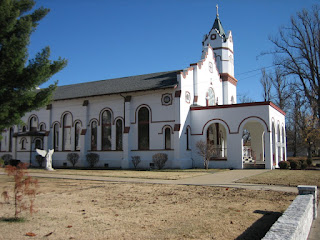
Snowfall is just one of a few Midwestern photographic highlights I have to share with you. There was also Thanksgiving in Missouri: Ruth, Max and little Niko actually came out to visit. I took this lovely picture of Niko with my 35mm camera.
Then it was off to Portageville, Missouri to visit my great aunt. Portageville barely qualifies as the Midwest because it's in Missouri, but really it's the south. It was hovering around 45-50 degrees the whole time we were there. It's stuck in time - I literally heard the word "colored" twice in two days - once from my great aunt and once from this lady who was running a rummage sale out of her storage unit. My mom bought an immersion blender for $3.

She also laid a penny on the train tracks for old times' sake.
My grandpa used to live in one of the houses behind her.
I also interviewed my great aunt and she let me scan a handful of her pictures. Actually, she said I could take them, but I couldn't really bring myself to do that. She has some ancient ones, but my obvious favorites are the ones with my mom.
 Mom before she was Mom, with marigolds.
Mom before she was Mom, with marigolds.
I recommend that everyone arm yourself with a digital voice recorder and scanner - and go interview your older relatives before it's too late. The southern Missouri of old is alive in my great aunt who still gets her hair done every week. She told me about picking cotton in the summers - 250 pounds was the most she ever picked. When I asked her where she went to high school, she answered, I didn't.
Aunt Vee in front of the house she still lives in.
Chances are, most of us don't have relatives who will be remembered by history. With digital cameras, recorders, and the almighty Internet, our generation has become a documentary generation to the extreme. We document our own histories as they happen. But this is where we come from: a time without digital-ness, cell phones and Facebook. Yes, even you can remember that time. When you talk to your relatives, you can go back even further - a time without television, a time when people only had two pairs of shoes: regular and church. Part of me comes from a land of ladies with southern accents and pecan trees. It's hard to believe there's such a hot place in my history when I'm living in a Minnesotan tundra. My entire maternal family went to the same Catholic school and church.
That's the one. St. Eustachius, founded 1905. My grandparents and parents were married here.
My mom and all her sisters went to school here.
My mom and all her sisters went to school here.
The greatest thing about this kind of documenting, which is why I recommend everyone do it, is that it takes far less work than making a full-length motion picture documentary, although if you have the bucks and the know-how, you should probably do that kind. Society says (and I won't argue) that if you were born after 1979, chances are that technology has made you a complete narcissist. They're even removing Narcissistic Disorder from the fifth edition of Diagnostic and Statistical Manual of Mental Disorders because really, who doesn't have it nowadays? Well, here's what I discovered. Even people as old as my grandfather and great aunt love to talk about themselves. Ask one question and you'll get a story. Now go out and buy a digital voice recorder.





